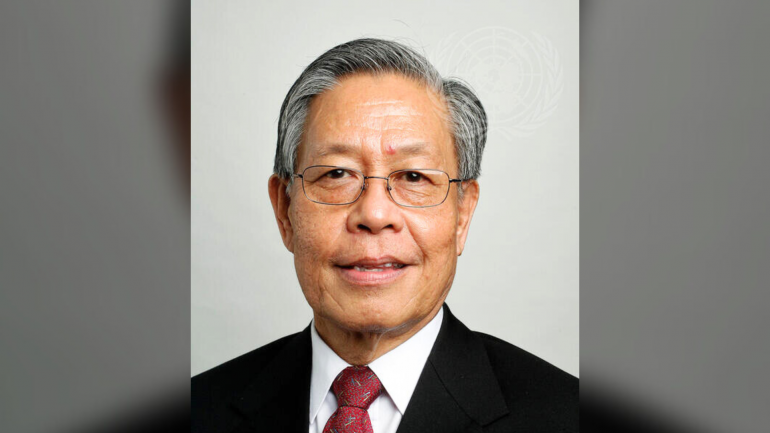Philippines: former Chief Justice Davide urges voters to heed conscience in elections

Philippine elections have long been characterized by "guns, goons, and gold," referring to the use of violence, large-scale vote buying, and widespread harassment.
Despite efforts by the Church and non-government organizations to educate people about electoral fraud and promote vigilance, the situation has only worsened.
An independent monitoring and assessment conducted by the International Coalition for Human Rights in the Philippines (ICHRP), a global network concerned about the country's human rights situation, found that the May 9, 2022, national elections did not meet international standards for being free, honest, or fair.
The ICHRP report emphasized that the situation has deteriorated further, with the massive use of social media to rebrand the image of certain corrupt politicians and manipulate the narrative.
However, former Philippine Supreme Court Chief Justice Hilario Davide, Jr. believes that voters can change the course of elections through conscientization.
"Clean, honest, peaceful, orderly, and credible elections start with every voter’s conscience," Davide said.
A diplomat and former chair of the Commission on Elections, Davide was also awarded the Knight Grand Cross of the Pontifical Order of St. Sylvester by decree of Pope Benedict XVI in 2011—the highest honor conferred on a layperson by the Catholic Church. On March 31, he launched a conscientization campaign on air, emphasizing that "konsensiya (Cebuano for conscience) is a "balaanong kabilin" (divine heritage).
"Konsensiya" is also the title of his early morning program, which is broadcast daily on the Catholic station DYRF.
Quoting philosophers, Davide described conscience as the "voice of the soul."
"There is no witness so dreadful, no accuser so terrible, as conscience that dwells in the heart of every man."
"Reason may make mistakes, but conscience never does," he added.
According to Davide, clean, honest, peaceful, orderly, and credible elections are possible if people listen to their conscience.
His conscientization campaign began in the run-up to the 2010 elections, where he spent 45 days explaining key provisions of the 1987 Philippine Constitution, particularly the Declaration of Principles and Accountability of Public Officials.
His goal was to remind voters that they must elect not just qualified and competent candidates, but also individuals who uphold honesty, integrity, humility, compassion, and righteousness. During his program, Davide clarified that his campaign is entirely his initiative—without funding or support from any candidate, corporation, or political party since it began in May 2010.
"This is a personal decision, and I will dedicate any remaining time to this campaign's chaos in the world, in our country, in our province, and among our people. I am determined to contribute to the education of our citizens, not just for today, but for the years to come.”
Now 89, Davide described elections as a historic community affair under the Philippine republican and democratic system. "The proper exercise of the sacred duty to vote is the number one prerequisite to ensure that only competent and well-qualified candidates are entrusted with the power to govern."
"Only through the proper use of this sacred duty can we achieve progress, happiness, peace, and a strong republic for our citizens."
He stressed that voters must elect candidates who are kind, righteous, honest, of integrity, hardworking, compassionate, helpful, humble, and prayerful—those who embody godly virtues.
Davide also pointed out that elections reflect the Declaration of Principles and State Policies in the 1987 Constitution, emphasizing that voters hold a significant responsibility when casting their votes.
"Why is one’s vote sacred? Because a voter is part of the source of sovereignty and belongs to the people from whom government authority emanates."
"Since only a few individuals can serve in elective public office, every vote is crucial in determining who will serve as president, vice president, senator, congressman, and other key positions."
He cited Article XI of the 1987 Constitution, titled “Accountability of Public Officers,” to highlight that public office is a public trust.
Expressing concern over the country’s current political climate, Davide criticized the recent arrest and surrender of former President Rodrigo Duterte to the International Criminal Court (ICC) for crimes against humanity, as well as the impeachment of Vice President Sara Duterte, which he described as "done in haste."
"I’m deeply worried about our country’s situation. Our political life is in turmoil, given the ICC case against the former president and the rushed impeachment of the vice president," he said in Cebuano.
"Our people are polarized, which threatens national security and stability."
"Adding to this uncertainty, Congress passed the worst, dirtiest, and most unconstitutional 2025 national budget. A budget that saw a reduction in education funding."
Davide emphasized that if the country faces massive challenges today, it is because those in power have failed in their duty and neglected their oath of office, as mandated by Section 1, Article XI of the 1987 Constitution.
What should voters do in the coming elections?
"Listen to your conscience—your divine heritage—which will whisper only what is right and just."
He urged voters to elect candidates who are kind, righteous, modest, honest, of integrity, clean-living, hardworking, compassionate, helpful, humble, and God-fearing. (END OF ARTICLE) By Malou Guanzon-Apalisok
Radio Veritas Asia (RVA), a media platform of the Catholic Church, aims to share Christ. RVA started in 1969 as a continental Catholic radio station to serve Asian countries in their respective local language, thus earning the tag “the Voice of Asian Christianity.” Responding to the emerging context, RVA embraced media platforms to connect with the global Asian audience via its 21 language websites and various social media platforms.











